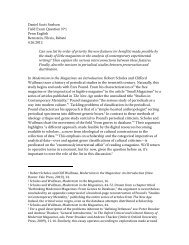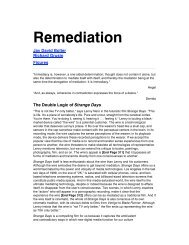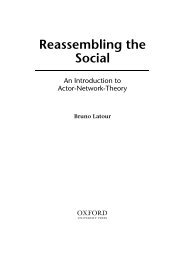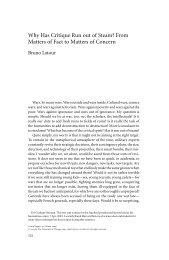The Exploit: A Theory of Networks - asounder
The Exploit: A Theory of Networks - asounder
The Exploit: A Theory of Networks - asounder
Create successful ePaper yourself
Turn your PDF publications into a flip-book with our unique Google optimized e-Paper software.
72 Nodes<br />
<strong>The</strong> development <strong>of</strong> the fields <strong>of</strong> statistics and demography was<br />
crucial for the development <strong>of</strong> modern biopolitics, what Foucault refers<br />
to as “sciences <strong>of</strong> the state.” Thus the population is articulated in<br />
such a way that its totalization—and thus control—may be achieved<br />
via methods or techniques <strong>of</strong> statistical quantification. This is not<br />
only a mode <strong>of</strong> efficiency; it also forms a political economy <strong>of</strong> mass<br />
subjects and mass bodies that was to inform political economists from<br />
David Ricardo to Adam Smith.<br />
Biopolitics, in its Foucauldian formulation, can thus be defined as the<br />
strategic integration <strong>of</strong> biology and informatics toward the development <strong>of</strong><br />
techniques <strong>of</strong> organization and control over masses <strong>of</strong> individuals, species<br />
groups, and populations.<br />
Foucault’s biopolitics functions via three directives, each associated<br />
with today’s network diagrams.<br />
1. To begin with, biopolitics defines a specific object <strong>of</strong> governance:<br />
“the population.”<br />
Foucault notes a gradual historical shift from the disciplining <strong>of</strong><br />
individualized bodies to the governance <strong>of</strong> populations. “Population”<br />
does not just mean the masses, or groups <strong>of</strong> people geographically<br />
bound (that is, “population” is not the same as “individual” or “territory”).<br />
Rather, the population is a flexible articulation <strong>of</strong> individualizing<br />
and collectivizing tendencies: many individual nodes, clustered<br />
together. Above all, the population is a political object whose core is<br />
biological: the population is not the individual body or organism <strong>of</strong><br />
the subject - citizen but rather the mass body <strong>of</strong> the biological species. 43<br />
In Foucault’s context <strong>of</strong> the emergence <strong>of</strong> the modern state - form, the<br />
existence <strong>of</strong> the state is consonant with the “health” <strong>of</strong> the state. <strong>The</strong><br />
main issue <strong>of</strong> concern is therefore how effectively to control the co -<br />
existence <strong>of</strong> individuals, groups, and relations among them. 44<br />
2. Biopolitics defines a means for the production <strong>of</strong> data surrounding its<br />
object (the population).









